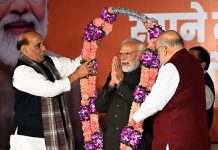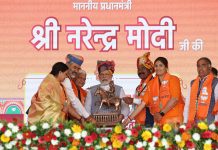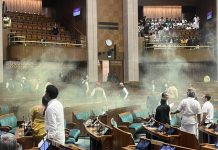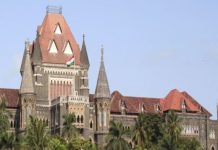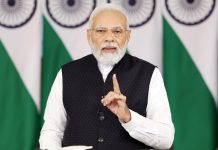The first task one needs to undertake to solve any problem is to understand it. On Punjab, where we needlessly continue to insist on turning an asset into a liability, understanding has been the greatest casualty. Therefore, before we get prescriptive on the subject, let’s first get the diagnosis right. Let us, in other words, get our facts in place.
 The Sikhs constitute below 2 per cent of the population of the country. They have a long tradition of being fiercely patriotic. But every now and then, when a nondescript Sikh declares himself a radical, the whole of our national media splashes it as ‘Breaking News’ or a headline as if the entire Sikh community had spoken through that self-styled spokesperson. It doesn’t matter that the self-proclaimed spokesperson generally has not won a formal mandate to represent a state legislative constituency or even a village Panchayat in Punjab. And there are at any given time more than two scores of such “sole spokespersons” of the Sikh community none of whom has ever won an election in Punjab — neither for a legislative nor for a religious role among the Sikhs.
The Sikhs constitute below 2 per cent of the population of the country. They have a long tradition of being fiercely patriotic. But every now and then, when a nondescript Sikh declares himself a radical, the whole of our national media splashes it as ‘Breaking News’ or a headline as if the entire Sikh community had spoken through that self-styled spokesperson. It doesn’t matter that the self-proclaimed spokesperson generally has not won a formal mandate to represent a state legislative constituency or even a village Panchayat in Punjab. And there are at any given time more than two scores of such “sole spokespersons” of the Sikh community none of whom has ever won an election in Punjab — neither for a legislative nor for a religious role among the Sikhs.
This guy called Jaspal Atwal who was at the heart of the controversy surrounding the recent trip of Canadian Prime Minister Justin Trudeau is one such “sole spokesperson” of the Sikhs. Quite embarrassing for the media that Atwal has since declared himself against all forms of violence, separatism, pledging himself to the unity and integrity of his country. “India is my country,” he declared the other day for emphasis.
It might surprise most people in the country and everyone in the media that the concept of an independent Sikh state was originally floated by none other than Pandit Jawahar Lal Nehru in the pre-independence period through a Sikh leader whose ear he had at that time. Although the term had popped up occasionally as a non-serious slogan by stray unrepresentative voices during the period leading up to the partition of the country into India and Pakistan, the concept was first given formal shape and the term Sikh Home Land first used by Master Tara Singh at Nehru’s behest as a “counterblast to Jinnah’s demand for an independent Muslim state, Pakistan.
Nehru had successfully converted the mercurial Sikh leader to a fake ‘political religion’ and persuaded him to demand a paradise not to secure it but only to deny it to someone else. In other words, the demand for Khalistan was first raised to counter and kill the demand for Pakistan. Thus, ironically, Khalistan was invented to preserve India’s unity and integrity, and not to break it. It was used to frighten the British away from the idea of Pakistan. The idea was to counter the geographical absurdity of partition with the geographical absurdity of another partition — in fact, many partitions to accommodate the Nagas, the Mizos, the Tamils, the Sindhis, the Pakhtoons, the Gurkhas, the Dogras and so on.
Sadly, Nehru himself later forgot to tell his party that the Sikh Home Land was nothing but a Congress sub-plot to defeat a larger plot.
Nehru knew better than anybody else that the British government and the people suffered from extreme political, moral and economic fatigue with regard to India. They wanted themselves out of the country as soon as possible. In fact, the creation of Pakistan itself, with the ridiculous absurdity of an East and West Pakistan separated by nearly the vast Indian stretch of over 2,000 kilometres, was the result largely of this British fatigue.
As the dream of a new country to be known as Pakistan drew closer to reality, the Sikh frustration over its realization grew stronger and stronger, culminating in Master Tara Singh drawing his long Kirpan (Sikh ceremonial dagger) out of it sheath to declare that Pakistan would be created only on his dead body. He threatened bloodshed in case Pakistan was created. Thus, the man who had raised the demand for a second partition of India Version — 2 was now threatening to die or kill — or both — in order to stall the Partition of India Version – 1.
Anyone familiar with the past and the present mood and conduct of the Sikhs has no problem in seeing that that every Sikh is as proud to be a Sikh as he is proud to be an Indian. In fact, the two identities are coterminous. Not many are aware that the first Guru of the Sikhs, Guru Nanak Dev ji, went to the extent of protesting even against God for subjecting his country — India — to a tragic repression and humiliation at the hands of the invading Mughals. “Khurasan khasmaana keeya, Hindustan draaya/ Aape dos na deyee kartaa, jum kar mughal chadhaaia (You have made the Mughals, these demons of death, from Khurasaan the Masters of my motherland/ So that you don’t get directly blamed for our tragedy, O God)”
This is the heritage from which every Sikh draws inspiration. No wonder then that their greatest icons include Arjun Singh, Marshall of the Air Force, and Lt Gen Jagjit Singh Arora and Lt Gen Harbaksh Singh, the heroes of the Bangla Desh and the 1965 wars with Pakistan.
The question then is: on whose behalf do all these “sole spokespersons” of a separate Sikh country named Khalistan speak? Whom do they represent when the whole Sikh community sings the hymns of Guru Nanak whose heart cries out for India?
There have been all sorts of noises surrounding the recent visit of the Canadian Prime Minister Justin Trudeau to India. Who were behind those noises? Was it the radical and radicalized yet marginalised section of Sikh politicos in India and abroad? Or was it the political opportunism and adventurism of Trudeau and his party in order to exploit the Sikh constituency for electoral gains at the expense of the Sikh community? Or could it be that some political parties in India who have been itching equally strongly to milk the so called ‘Hindu backlash’ for electoral gains were orchestrating these controversies?
Whoever is responsible for these dangerous games being played in the name of the so-called Sikh demands, he is doing this country a great disservice and is hurting its cause grievously. And the Sikhs are already feeling as if they were mere electoral fodder being fed upon from the opposite ends by contrary forces.
A vast majority of peace-loving Sikhs here have always believed that their whole community being given a bad name for the sins of a radical fringe which itself is sponsored by one or the other of the above forces. Worse, this vilification and demonization of the Sikhs is being done on purpose. If that is true, then we are falling into the trap laid by the arch enemy of our country — the ISI of Pakistan.
Ironically, it is obvious to everyone in Punjab that the Sikhs are the only people who really want a quick and quiet burial for these Khalistan noises. A vast majority of the peace loving Sikhs — both in India and abroad — firmly believe that Khalistan , or a bogey of it, is being thrust down the throat of a strongly protesting patriotic Sikh community by a combination of evil forces. None of these forces and elements represents the Sikh community nor do they have the interest of the community at heart. Whenever Khalistan makes headlines, the Sikhs view it as a sign of some dangerous game being played against them. The Sikhs know that these separatist noises in their name actually deflect focus away from their legitimate demands and the genuine causes and grievances of the community. If you look closely at these demands and grievances, it is easy to see that these are the causes, the grievances and the demands of the rest of the countrymen too: a cry for justice for the massacre of 1984 and a fair deal for Punjab, a solution to the problems of the peasantry in the country. There are also some grievances specific to the Sikhs and the community wants that these grievances can be and must be resolved within the ambit of the Constitution of the country.
The Sikhs also find it hard to believe that they are subjected to vilification even on demands which are perfectly reasonable, humane and within the nationalist and constitutional parameters. One of these demands relates to a constitutional recognition of Sikhs as a separate religion — not a separate country, mind you, just a separate religion. They react strongly to being dismissed as “not a religion but a mere branch of Hinduism”.
Similarly, Sikhs cannot understand why their countrymen should object to the description of the 1984 massacre of thousands of Sikhs (just because they were Sikhs) as a “genocide”. There is nothing in the dictionary meaning of the term genocide which can be even remotely construed as anti-national. Genocide refers to a large number of people belonging to a particular nation, ethnic group or religion or community or race being killed because of their religious, national, ethnic or communal identity. That is precisely the holocaust that the Sikhs had to endure in 1984. The Sikh grievances are against the Congress party or against the government of India for its refusal or failure to provide justice to the community as per the law of the land and the constitution of the country. Why should the killers of thousands of innocent Sikhs in 1984 be roaming free even 34 years after the tragedy struck the national capital?
The manner in which the government of India chose to respond to the questionable aspects of Justin Trudeau’s visit to India has left much to be desired. The government, it seems, chose the wrong language to speak the right stuff or chose the wrong signals to deliver the right message. Their handling of the issue further strengthened the impression about our failure or refusal — or both — to understand that Khalistan is a non-issue for a very vast majority of the Sikh community in India and abroad, including Canada. If Trudeau fumbled, blundered or played mischief by violating norms of diplomatic decency and did things that offend our national sensitivities, then the government of India also did not exactly cover itself with glory through its handling. If the radicals wanted to misuse the Trudeau visit to put the Khalistan issue on the front burner, then it seems the government merely obliged them. The government’s handling needed to be manicured in a manner that it should have denied any media or diplomatic mileage to those trying to internationalise a radical cause against India.
As for Trudeau, his mistakes or failures needed to be segregated from what suited the radicals. He needed to be confronted on the diplomatic high table on the causes of our hurt national sensitivities. The Government’s handling of the trip should never have strengthened the radical case that the country’s top executive suffers from bias against Trudeau because of the pre-eminent positions he has given to the Sikhs in his government. That’s the message that we ended up conveying.
The government needed to highlight how the interests of the peace-loving Sikh community are in direct contradiction with the vested stakes of the radicals fringe operating from abroad. The Sikhs in India know about this dichotomy. Even during this trip, all the mainstream Sikh voices — from the Akalis led by Sukhbir Singh Badal to the SGPC and the DSGMC led by Manjit Singh GK and even Punjab Chief Minister Capt Amarinder Singh — rubbished Khalistan as a “non-issue for the Sikhs”.
Why should our policy makers not be listening to these voices that actually represent the Sikhs?
The Sikhs regard their stakes and destiny as firmly tied with the destiny of their country India. They seek justice and fair-play as per the laws of our land, and they strive for their right to live in patriotic dignity. They fight against discrimination like any other Indian would: through peaceful and democratic means.
The only time a hardliner got a mandate in Punjab, including from the Hindus in the state, was in 1989 and then too, the candidates fielded by the party led by S S Mann actually went around and paid obeisance at Hindu temples during the campaign in order to wash the “radical” tag. This was extremely significant even as symbolism because this conclusively drove home the message that in order to win the confidence of the people of a predominantly Sikh Punjab, one has to take the route of moderation. Be it the Panchayats or the Parliament, the moderate, and not the radical, Sikh leaders rule the hearts and minds of the Sikh community. There is a message in this which the country needs to understand and respect.
The way to understanding Punjab and the Sikhs lies through the hearts and minds of the moderate mainstream. The Sikh community itself is surprised why the successive governments’ perception of Sikh aspirations is always different from how the Sikhs themselves view their destiny. But anyway, it is time we corrected our mistakes on Punjab in the past — especially with regard to instilling a sense of confidence and dignity in the minds of the patriotic Sikh community.
It is to be hoped that Prime Minister Narendra Modi, who has considerable direct experience of Punjab and has close affinity with its culture having served his party in various capacities in this region, would use his understanding and also his dynamism to change the national narrative on this sensitive and crucial issue. There is a lot he can achieve in this direction — and all of it would be a great service to the nation.
letters@tehelka.com


